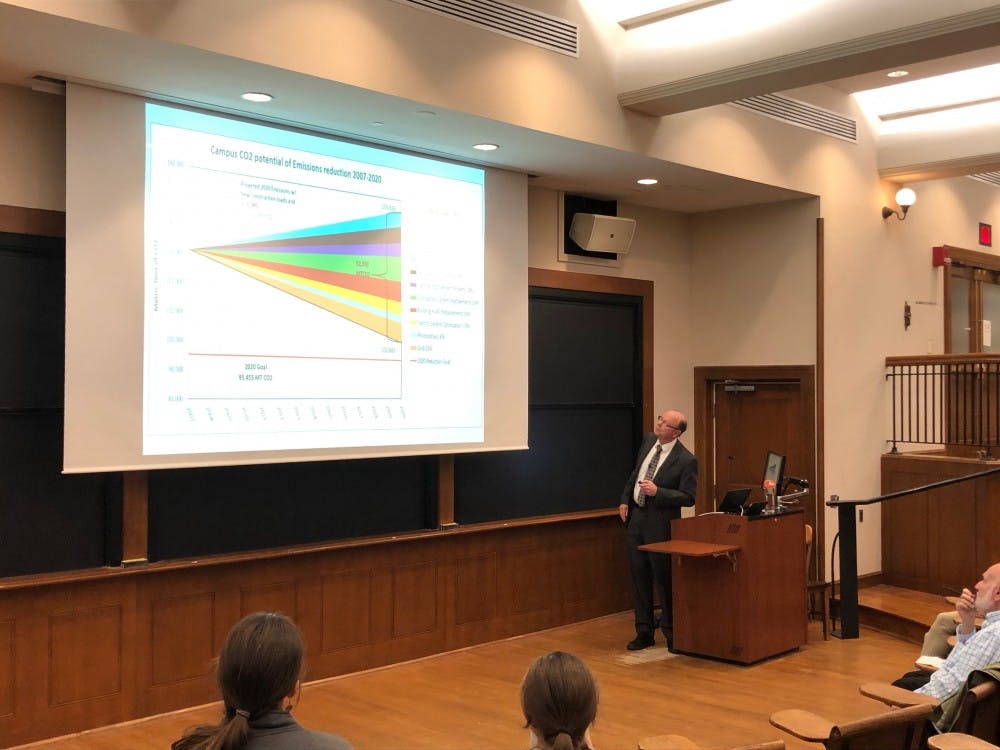Ted Borer, manager of the University Energy Plant, announced that the University plans to reduce total carbon footprint to net zero by 2046.
The University first launched their sustainability plan in 2008, followed by a 2017 follow-up plan which addressed campus goals until 2026.
The 2019 action plan, announced in the Climate Action Town Hall forum, projected the long-term plan of the sustainability office. Earlier in the year, on Earth Day, the University launched a sustainability plan. The town hall meeting is one result of the plan.
A three-minute video with narration by Borer guided readers through changes in the campus, measuring physical changes, tracks of carbon footprint, and research equipment. Since the University has expanded in size, new construction yields higher carbon footprint. Borer called for early action and cited the 2019 action plan as one possible solution.
The University plans to build a geoexchange system that uses heat stored underground to cool the campus during winter. According to Borer, the University can fully accomplish that task with current investments, although he noted that requesting permission to do so will delay plans.
Research has shown that maintenance of old systems supersedes the implementation of new systems, Borer continued. Once sustainable practices within the environmental department are iterated, other departments and schools will follow.
Borer added that the University can practice actions that are scalable and repeatable. Operational practices, research, and teaching all contribute to possibilities from which to explore sustainable policies.
The problem lies in implementing climate neutrality practices with little disruption to campus life, said Borer. Currently the University manages a solar field 25 football fields in size, which he said helps the campus avoid about 3000 metric tons of carbon dioxide.

When asked if they were aware of the solar field, the majority of the older community members, and few undergraduates, present at the town hall raised their hands. Among the 60 attendees, approximately 10 percent were students.
“As individuals, we can do things. As a campus community, we can do things. And because we are higher ed, we can also work with the surrounding community on shared objectives,” Office of Sustainability director Shana Weber said.
“The Sustainability Action Plan is really meant to serve as a platform for action,” Weber said. “It encapsulates a lot of the work we have done in the past decade and what we can do next.”
The next presenter, Tom Nyquist, Executive Director of Engineering and Campus Energy, focused on “Advocacy, advocacy, advocacy.”

Nyquist discussed strategies to tighten buildings, convert steam to hot water, increase the use of on-campus renewable energy, and purchase off-campus renewable energy. The final solutions, he said, lie in the hands of student advocates and responsible voters.
“As students, your lives will be affected by climate change if we as a society don’t do something now,” said Nyquist said. “We have 55 weeks to get our act together because the next election has a potential great turning point. If we get politicians in there that believe us, we can make a lot of progress.”
Immediate results for the University include reducing energy by one-third, creating five-year average paybacks on energy projects, and reducing carbon dioxide emissions levels to 1990s levels by 2020.
If a student perpetually sees energy waste — such as empty rooms with running air-conditioning or open dorm windows when the heat is turned on — the University encourages them to notify the facilities’ control center at cscs@princeton.edu to help reduce carbon footprint to zero.
Borer’s announcement came at the Climate Action Town Hall in Guyot Hall on Friday afternoon.








